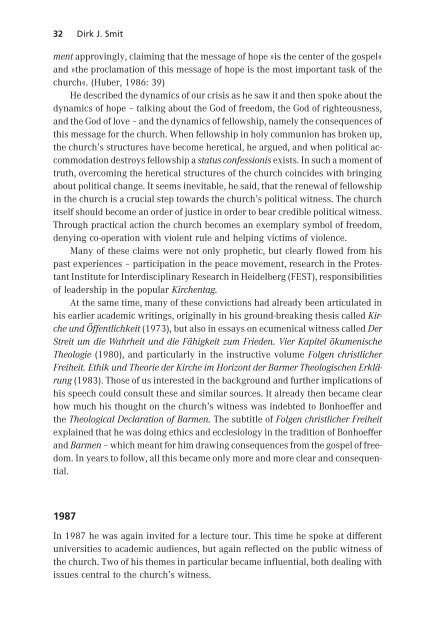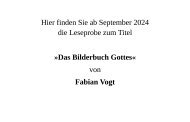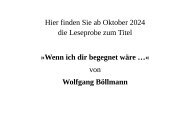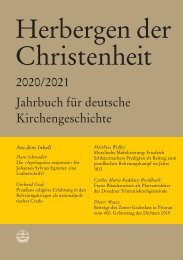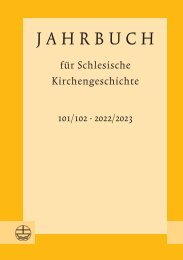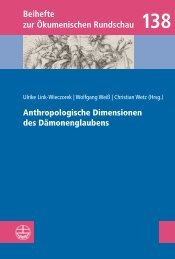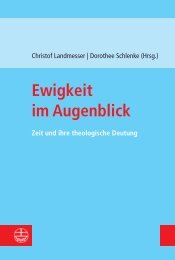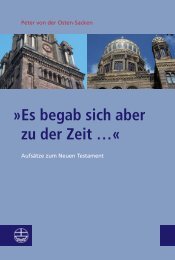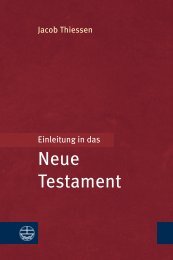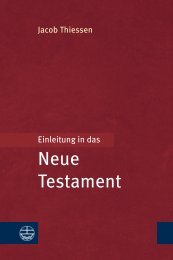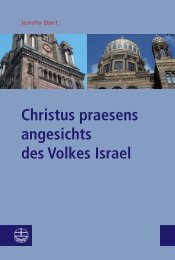Heinrich Bedford-Strohm | Peter Bubmann | Hans-Ulrich Dallmann | Torsten Meireis (Hrsg.): Kritische Öffentliche Theologie (Leseprobe)
Das Programm der Öffentlichen Theologie ist in unterschiedlichen internationalen Kontexten auf je eigene Weise entstanden und lässt sich als Diskursformat verstehen, das auf eine veränderte Öffentlichkeit reagiert und mittlerweile im Global Network for Public Theology zu einer eigenen akademischen Gestalt gefunden hat. Da diese Geschichte nicht nur im deutschsprachigen Kontext ohne Wolfgang Hubers Einfluss nicht nachvollzogen werden kann, ist es sinnvoll und angemessen, ihm einen Band zu widmen, der die Begründung und Weiterentwicklung der von ihm angestoßenen kritischen Spielart Öffentlicher Theologie zum Thema hat.
Das Programm der Öffentlichen Theologie ist in unterschiedlichen internationalen Kontexten auf je eigene Weise entstanden und lässt sich als Diskursformat verstehen, das auf eine veränderte Öffentlichkeit reagiert und mittlerweile im Global Network for Public Theology zu einer eigenen akademischen Gestalt gefunden hat. Da diese Geschichte nicht nur im deutschsprachigen Kontext ohne Wolfgang Hubers Einfluss nicht nachvollzogen werden kann, ist es sinnvoll und angemessen, ihm einen Band zu widmen, der die Begründung und Weiterentwicklung der von ihm angestoßenen kritischen Spielart Öffentlicher Theologie zum Thema hat.
Erfolgreiche ePaper selbst erstellen
Machen Sie aus Ihren PDF Publikationen ein blätterbares Flipbook mit unserer einzigartigen Google optimierten e-Paper Software.
32 Dirk J. Smit<br />
ment approvingly, claiming that the message of hope »is the center of the gospel«<br />
and »the proclamation of this message of hope is the most important task of the<br />
church«. (Huber, 1986: 39)<br />
He describedthe dynamicsofour crisis as he sawitand then spoke about the<br />
dynamics ofhope – talking about the God of freedom, the God of righteousness,<br />
and the God of love – and the dynamicsoffellowship, namely the consequences of<br />
this message for the church. When fellowship in holy communion has broken up,<br />
the church’sstructures have become heretical,heargued,and when political accommodation<br />
destroys fellowship a status confessionis exists. In such amoment of<br />
truth, overcoming the heretical structures of the church coincides with bringing<br />
about political change. It seems inevitable,hesaid, that the renewal of fellowship<br />
in the church is acrucial step towards the church’spolitical witness. The church<br />
itself should become an order of justice in order to bear credible political witness.<br />
Through practical action the church becomes an exemplary symbol of freedom,<br />
denying co-operation with violent rule and helping victims of violence.<br />
Many of these claims were not only prophetic, but clearly flowed from his<br />
past experiences – participation in the peace movement, research in the Protestant<br />
Institute for Interdisciplinary Research in Heidelberg (FEST), responsibilities<br />
of leadership in the popular Kirchentag.<br />
At the same time, many of these convictions had alreadybeen articulated in<br />
his earlier academic writings, originally in his ground-breaking thesis called Kirche<br />
und Öffentlichkeit (1973), but also in essays on ecumenical witness called Der<br />
Streit um die Wahrheit und die Fähigkeit zum Frieden. Vier Kapitel ökumenische<br />
<strong>Theologie</strong> (1980), and particularly in the instructive volume Folgen christlicher<br />
Freiheit. Ethik und Theorie der Kirche im Horizont der Barmer TheologischenErklärung<br />
(1983). Those of us interested in the background and further implications of<br />
his speech could consult these and similar sources. It already then became clear<br />
how much his thought on the church’s witness was indebted toBonhoeffer and<br />
the Theological Declaration of Barmen. The subtitle of Folgen christlicher Freiheit<br />
explained that he was doing ethics and ecclesiology in the tradition of Bonhoeffer<br />
and Barmen – which meant for him drawing consequences from the gospeloffreedom.<br />
In years to follow, all this becameonly more and more clear and consequential.<br />
1987<br />
In 1987 he was again invited for alecture tour. This time he spoke at different<br />
universities to academic audiences, but again reflected on the public witness of<br />
the church. Two of his themesinparticular becameinfluential, both dealing with<br />
issues central to the church’s witness.


